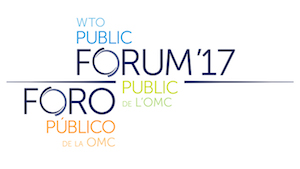IP and other e-commerce-related legal frameworks’ harmonization as a mean of inclusive trade
28 Sep 2017 15:30h - 17:00h
Event report
[Read more session reports from WTO Public Forum 2017]
With the rapid changes in global trade generated by digital technology, how can different legal regimes, such as intellectual property rules, be harmonised so that they do not hamper cross-border trade and so that they lead to more inclusive trade? This provided the underlying question of the session, introduced by moderator Luca Rinaldi, Partner at Gianni, Origoni, Grippo, Capelli & Partners, and Member of the Standing Committee on the Agreement on Trade-Related Aspects of Intellectual Property Rights (TRIPS) of the International Association for the Protection of Intellectual Property. According to Rinaldi, a lack of harmonisation of trade rules is one of the main obstacles preventing e-commerce from leading to genuinely inclusive trade. Rinaldi presented an overview of international and regional efforts towards harmonisation, including initiatives at the WTO, UN, the Organisation for Economic Co-operation and Development (OECD), EU, the Association of Southeast Asian Nations (ASEAN), the Economic Community of West African States (ECOWAS), the African Union, and in Latin America. Yet, despite these attempts, different legal requirements lead to a fragmented environment, while imposed standards do not take into account the different levels of trust towards e-commerce in different societies.
Ricardo Lagreca, Legal and Governmental Relations Senior Director, MercadoLibre, talked about intellectual property protection from the point of view of an e-commerce platform in Latin America. In Latin America, intermediaries – such as MercadoLibre – are not liable for the content on their platforms. Yet, MercadoLibre’s Intellectual Property Protection Program ensures that each of its operations complies with local laws, it includes specific provisions related to intellectual property in its Terms & Conditions, and it has special procedures for taking down content that breaches intellectual property rights. In addition, the company builds awareness on intellectual property among its users.
Speaking from a government perspective, Ana Leyva Wong, Head, Lambayeque Regional Office, Instituto Nacional de Defensa de la Competencia y de la Proteccion de la Propiedad Intelectual (Indecopi) of Peru, talked about the way in which her agency uses digital technology to advance intellectual property and consumer protection, as well as the ways in which the agency addresses the intellectual property and consumer rights aspects of e-commerce. It has managed to strengthen mechanisms to verify operations online to prevent fraud and protect consumers’ interests, which is often done in collaboration with the private sector. Ultimately, Wong is aiming for the same protection for e-commerce as for regular commerce, which requires reducing the digital divide, boosting confidence in e-commerce, and empowering and informing consumers.
Finally, Hosuk Lee-Makiyama, Director, European Centre for International Political Economy, highlighted the inclusive power of e-commerce, which has become an increasingly ordinary way of doing business. In fact, he claimed that in the WTO, ‘we might just as well replace the ‘W’ with ‘E-‘’. Yet, he was surprised that many consider intellectual property rights (IPR) as an entry-market barrier. In fact, Lee-Makiyama argued that without IPR, there would be no supply. Yet, IPR enforcement risks leaving some countries behind. Therefore, it is key to strike the right balance between IPR enforcement and maintaining a model where some of the world’s regions and user groups are not excluded.
Lee-Makiyama addressed two additional, related issues that need to be taken into account when considering the future of e-commerce and intellectual property:
- Data ownership: who owns user-data and user-generated data?
- Digitalisation of everything: with 5G, the Internet of Things (IoT), and the digitalisation of entire companies, what happens when trade secrets and blueprints are at risk of being hacked or stolen, or when the network goes down? This opens up a new set of questions related to liability.
Lee-Makiyama concluded that while he didn’t know what the future of IPR would hold, IoT and digital businesses will have to be protected in one way or another, and the door to this discussion must be opened.
by Barbara Rosen Jacobson
Related event

